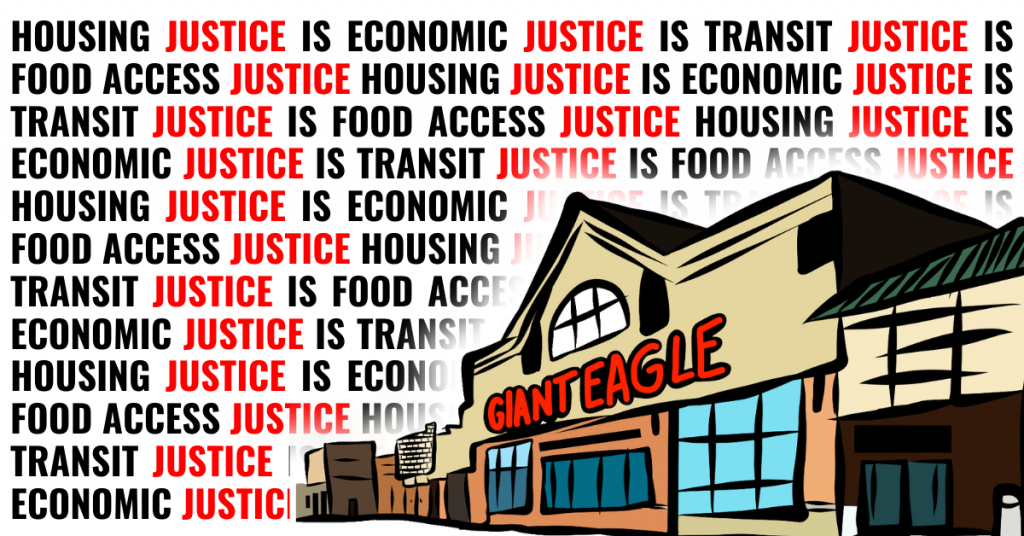
Collectively, we have won some important housing, food and transit justice victories and set a new floor for what community benefit should be expected from development without the need for public subsidy.
Over the past year and a half, neighborhood residents and organizational stakeholders from Pittsburgh United’s Housing Justice Table, Pittsburghers for Public Transit (PPT), Just Harvest, and the Pittsburgh Food Policy Council (PFPC), have been organizing for a just redevelopment of the Giant Eagle Shakespeare site on Penn and Shady Ave in East Liberty.
We have shown that by building less structured parking we can free up millions of dollars to go towards real community benefits – affordable housing, transit investment, and expanded food access.
Black people deserve reparations, and trading car housing for affordable housing is one way to get there. East Liberty has been a site of violence against Black families. Once a thriving center of Black commerce and community, the last two decades of URA, City and corporate-led redevelopment has led to the displacement of thousands of Black residents– a trend which has only accelerated in the last few years.
The Giant Eagle Shakespeare is situated at one of the most transit-rich intersections in the City, with the renovated East Liberty busway stop and a dozen bus lines.
It’s important to remember that it is our public investments in things like great transit service that makes the Giant Eagle Shakespeare site so profitable, and helps generate demand for the proposed housing units. So we’re not asking for charity. We’re calling for developers to provide some community benefit in return for the profits that our public investments have helped them collect.
Our Coalition’s Most Important Gains So Far:
- The reduction of 600 proposed parking spaces to 420, which means better air quality, safer streets for transit riders, pedestrians and cyclists, more incentive to take the 12+ bus lines to and from the site, a shorter parking structure and ~ $6,300,000 that can go to community-serving amenities below like more affordable housing, complete streets and transit passes.
- 10% of housing units will be rented at the 50% Area Median Income (AMI) for 35 years, and the owner will accept Housing Choice Vouchers. The affordable units will be indistinguishable and intermingled with the non-subsidized housing and will help address the need for deeply affordable homes in a city that has a shortfall of 20,000 affordable units. We celebrate that this is a higher standard of mandatory affordable housing units than the Inclusionary Zoning legislation that was won in Lawrenceville (10% of rental units at 50% AMI, with no obligation to accept housing choice vouchers). Most importantly, the developer will not use tax dollars or abatements through programs like the LERTA, TIF or TRID, so 10% quality affordable housing with a commitment to accept Housing Choice Vouchers should be considered a new floor for developers to provide affordable rental units without public subsidy.
- $50,000 will be set aside towards bus passes for the housing units. Along with the reduction of structured parking, free bus passes should incentivize transit usage as a default mode of transportation in one of the most transit-rich neighborhoods in Pittsburgh.
- Assurances to provide culturally responsive foods in the new Giant Eagle with an equivalent or greater selection and variety of fresh produce and other healthy foods, and a commitment to staffing the rebuilt store from the community. Advocates and community partners continue to participate in good-faith negotiations with the company about subsidized delivery and/or transportation to consumers who are reliant on this grocery store during the proposed store closing/redevelopment period. Both delivery and shuttle services for consumers without convenient food options can help ensure equitable access to food shopping while the store is closed for construction.
We’re not done yet, and we’ll need your help to see this work across the finish line.
We need you with us to ensure that the Giant Eagle Shakespeare is an equitable transit-oriented development that doesn’t lead to further East Liberty displacement. We need to ensure that our neighbors maintain and expand their access to healthy, affordable, culturally-responsive foods during and after this redevelopment.
We are circulating an organizational sign-on letter to call on Giant Eagle to fulfill our remaining demands, listed below. If your organization would like to sign on, or if you would like to join in the Giant Eagle Shakespeare Campaign, please reach out to Joshua Malloy, PPT’s community organizer, at josh@pittsburghforpublictransit.org or at (412) 607-7726.
What’s Left to Win:
For Housing Justice: The rents on an additional 5% of the units (which will be rented at 80% AMI) should be lowered to meet the Housing Choice Voucher Payment Standards, so that 15% of the apartments are truly accessible to low-income residents. Moreover, we are asking for a commitment that if the developer should choose to take public subsidy or a tax abatement in the future, that any affordable housing commitments should be in addition to existing commitments.
For Transit Justice: The set-aside for transit passes should be increased from $50,000 to $123,337.50 to ensure that all housing units receive a full year transit pass, for 2-4 years. We are additionally calling on the developer to do an annual impact assessment of the transit passes on transit usage, parking demand and effect on the demand for rental units.
For Food Justice: We want those assurances around product selection and variety to become public commitments. Giant Eagle should provide free grocery delivery and subsidized shuttle services to alternate stores for residents who are most at risk at losing food access during the renovation. There should be serious consideration given to providing a pop-up fresh food access point for pickup and delivery in Larimer and Homewood, and an on-going process and direct outreach to shoppers to solicit feedback as the redevelopment progresses.